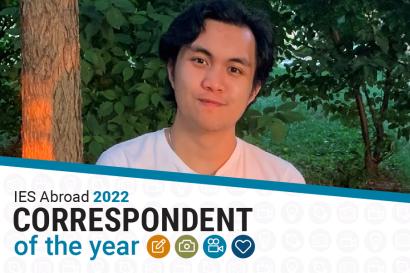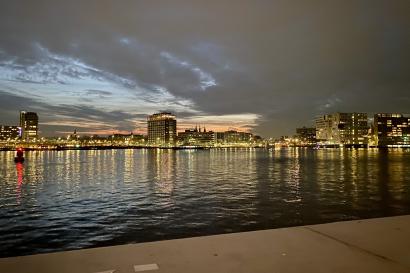
On Jägerstraße, not very far from Brandenburger Tor, one can find a plaque in honor of a foreign, wholly non-German historical figure.
This is due to the fact that, from late October of 1886 to May of 1887, famed Philippine hero Jose Rizal took up residency in Germany, a time well documented through his notes and letters. For example, in his (second) family language of Castilian Spanish, he jotted down in reference to the “so-called Japanese Palace” he encountered in Dresden, “[It] is more Chinese than Japanese, because the very exhibits that are responsible for its name are more Chinese than anything else.” Considered (in-part) ethnically Chinese in the contemporary racial caste laws of the (so-called) Spanish East Indies, it’s reasonable to assume that he found the Orientalist conglomeration of East Asia by European fetishists confusing at best and frustrating at worst.
If he did have an opinion on the matter, (which he probably did), it probably ended up somewhere buried under the layers of mixed language found within his diaries. Speaking (with varying degrees of familiarity) somewhere supposedly over a dozen languages and dialects, he infamously would constantly switch from language to language between journal entries, attempting to preserve this fluency. He cheekily would tell younger relatives still in the midst of their education to, “Write [back] in Spanish, if you can,” a language he had mastered in childhood.
Ironically, he, by his own admission, wasn’t very good at writing prose in Tagalog, the indigenous language of his province of Laguna. When translating Johann Christoph Friedrich’s Wilhelm Tell from its German original into Tagalog, he related in several different letters that he struggled finding a native equivalent (that he was aware of) for the German Freiheit, freedom. He apparently only encountered the native kalayaan, (then romanized as kalayahan), as translation of the Spanish libertad years well into his adulthood.
Of Berlin, though, he is known to have spoken quite fondly— Writing (in German) in reference to his interactions with Berlin’s academics, he remarked that, “I always think of Germany and the German scholars… when I hear German spoken, I am happy as though it was my mother tongue.” Speaking of German “fidelity and honesty,” he made sure to mention that these virtues “[were in spite of] the rude exterior, at times, of some [Berliners],” comically demonstrating that the city’s essential character somehow endured more than a century, two World Wars, and a wall. He lived on Jägerstraße, in what is now the Kiez of Mitte, for 6 months, spending a portion of those months being treated by local doctors for what they had diagnosed as "consumption."
He would come to publish his Spanish-language magnum opus, Noli Me Tangere, a satire on the racial and colonial tensions of the Philippines under Spain, at a Berlin publisher. This novel, eventually finding its way across oceans to Rizal’s homeland, would spur independence movements that eventually would lead to the formation of a short-lived first Philippine republic—until the awkward aftermath of the Spanish-American war, a Philippine-American war, and an ensuing 35 or so years of ambivalent commonwealth administration under the United States.
Before that, though, Rizal would come to be nicknamed “Uliman” (a nativized Tagalog form of the Spanish “Aliman,” for German) by his peers in Manila, and would have a few lengthy arguments with local authorities on the topic of, “Yes, I made a radical, semi-revolutionary book while in Europe. No, it’s not the result of Protestant, German brainwashing, please stop saying that.”
The similarity of our situations is charming. The obvious bits—a Filipino (American) traveler coming to Berlin— are shared between me and most of the people for whom the placard on the side of Jägerstraße 71 has any meaning. It’s a reason to take a picture, to remember the heroes of the homeland, to comment on the several holidays held in his honor.
But other points of synchronicity edge towards being tempting—my father, for instance, shares an alma mater of the University of Santo Tomas with Rizal, even having earned his bachelor’s in the figure’s initial major of philosophy. True, still, that Tagalog is our family home’s Philippine language of choice. Truer even still that I’d have better chances at writing in English than in Tagalog, at least at this point in my life, but can wade the waters of several tongues. Rizal and I, though raised in the Catholic tradition, both hold our reservations on the Church as a political structure but adore, at least in some overlapping ways, the spiritual tradition of it. And his recorded Chinese-Spanish-Tagalog mixed lineage, varyingly rendered as mestizo, creole and torna atras between authors, historians, and chroniclers, cleanly maps unto my own. In the sense of literal maps, we both took up residence within the (surprisingly broad) range of Mitte.
Ostensibly, we both came to Berlin for the same reason: continuing an education at a site of discovery, a crossroad of cultures, at a center of the world.
Of course, where he studied ophthalmology, I’m continuing a major in sociology. Where there’s well over a century wedged between our respective stays in Berlin, there’s also about a foot between his estimated height and my actual height of 6’1”. My own debatable understanding of five languages and equally debatable competency in three can hardly hold a candle to the legendary polymath’s apparent achievement of at least seven, and, at most, two dozen. We stand at different poles of colonial and post-colonial.
I make the comparison not to self-aggrandize myself—I don’t and won’t promise a nation-changing legacy— but rather to ground myself in a path that has been walked before, to see myself in something that isn’t me. On such a path, I’m tempted to claim that Rizal was only treated so well because he had been a racial unknown. Even in Berlin, a city where being ethnically German could hardly matter less for most people, there remains no clear definition for me to fit into. Too prone to small talk to be German, too versed in German to be American, too American and educated to fit into conventional, stereotyped images of Southeast Asian migrant workers.
What is to be made, then, of a swarthy young student with mixed features, an ethnically unclear name, a western education, and a biting comprehension of the local language?
In the case of Rizal, one can suppose he sometimes became an object of fascination. He recorded a moment in which renowned Berlin scholar Rudolf Virchow jokingly suggested that he become an object of anthropological study— “I answered that I was willing to submit myself to his study, for the sake of science,” he wrote, “and I promised to show him another specimen, my countryman.” He wrote later that Virchow requested him to, “read a paper on Tagalog before the Anthropological Society.” The contemporary Berlin academic circle clearly found, along with actual scholarly promise, some apparent cultural novelty in young Jose Rizal. Unwilling for these German greats to adopt the same “deep-seated prejudices” as the Spanish colonial government, Rizal persistently obliged their curiosity.
My conversational German surely isn’t the polite, albeit evidently witty type that Rizal had mastered, all those many years ago. Instead, it’s spoken with a Berlin accent and a fondness for Jungendsprache— youth speak. But at the bars, beer gardens, and clubs, I’ve been occasionally requested to parrot some Tagalog for those curious at my background and the awareness I had of the world in spite of being American. “It’s really pretty,” I’ve been told, three or four or seven times. “I’ve never heard anything like it,” some go on to say, “but, I think I could understand a little bit of it.” It’s both Virchow’s compulsion for scientific investigation and offer of genuine friendship, compressed into a minute-long interaction. But instead of occurring over ethnographic research, it happens over half-finished half-liters of beer in a Kreuzberg bar.
Part of me counts myself lucky for not being at the receiving end of intentional, racist, hostile harassment— I’ve been spared the rude blurts of “ni hao,” the obscene eye-distorting gestures, and the occasional, bizarre orientalist comment other Asian students past and present have received. I credit this largely to my “wow that’s really impressive, you only stayed in Berlin a month before this program? I thought you were from here! you don’t sound like an American at all! you speak so fluidly” accent in German. The worst I’ve gotten is a drunk Turkish-German man approaching me and a Latine friend at a bar, guessing at our ethnicities by labelling us “Italian and Vietnamese” in a hamfisted, but ultimately well-intentioned attempt at migrant solidarity.
But every so often, I catch a German child, one that the government would describe as being of “Asian migrant background,” staring at me on the train. It’s the same look that the owners of Asian groceries give me, the one of restaurateurs when I come to pick up my order. The same awkward, badly communicated kindness behind questions of “Where are you from?” and follow-up questions of “Where are you originally from?” from other Asians in Europe. (Questions of “Were you born here?” and “Are you 100% Asian?” optional.) The feeling that even other Filipinos put into words when they express amazement at features they’ve never seen on a person my age, with the exception of foreigners. “Ah! We thought you were so much older!”
They concede this as I tower over them, having expected them to say as much. They all see someone who isn't them, but is like them, but not like them.
Is it to escape this feeling that Rizal had himself marked as indio puro—purely indigenous—on his death certificate? To finally seek refuge from the complexity of being too many things at once, and to rest in the comfort of easy categorization?
His mixed heritage and multi-cultural complexity, his Chinese ancestry and German education in particular, were often used as xenophobic polemic by the colonial government against his activism. How could a foreigner care so much, after all?
This must have been a sensation he knew well.
It must be the same, complex emotion that I feel when staring back at Rizal studying in Berlin, who, in turn, was staring at a recently unified Germany as a reflection of his native, colonial Philippines. In that mirror that is not a mirror, there are many things that remain the same in the reflection that is not a reflection— and just as many features that remain an unfamiliar surprise. It’s a partial co-identification, a co-acknowledgement, a co-recognition. A staring at the self outside of the self that’s still not really the self. It’s a sensation I have no kurt word for, one I grab at clumsily to describe, like Rizal puzzling over how to translate the word Freiheit.
But, I guess it’s okay to not have a word for something. At least for the moment. Studying abroad, while surely about discovering the world outside your own, is also about discovering the world recorded inside yourself.
Writing to his Germanophone friend and fellow academic Ferdinand Blumentritt, Rizal reflected, "[My countrymen] are creole young men of Spanish descent, Chinese [mestizos], and Malayans; but we call ourselves only Filipinos." Perhaps, then, that became his word for such a feeling.
Jose Rizal, I hope, would have been happy at knowing that Berliner Deutsch—Berlin German—had now Atze. In his native Tagalog, he would have known the word kuya—borrowed from old Hokkien Chinese 哥兄, ko-hia—a word with the exact same feeling, intention, and sentiment. A word that, despite its literal meaning, can be liberally applied to just about any male friend of yours.
Atze. Kuya. A big bro, a guy you trust, a dude you admire, someone you care for.
Something that is not something but still is that something all the same.

Avery Trinidad
Hey there! I'm Avery Trinidad, a junior majoring in Sociology and concentrating in Global Studies over at Williams College! I think long walks by the beach are an unironic fun time, have made a hobby of writing songs with ukulele accompaniment, and have an apparent talent for making eggs. I'm a big ol' New York native, with a booming voice and headstrong attitude to boot. Though born and raised in Manhattan, I've had the opportunity to take German as a third language since my freshman year of high school. I'm looking forward to documenting my experiences in Berlin, especially after it emerges from such a tumultuous time in not only its own history, but the world's! Bis bald!






